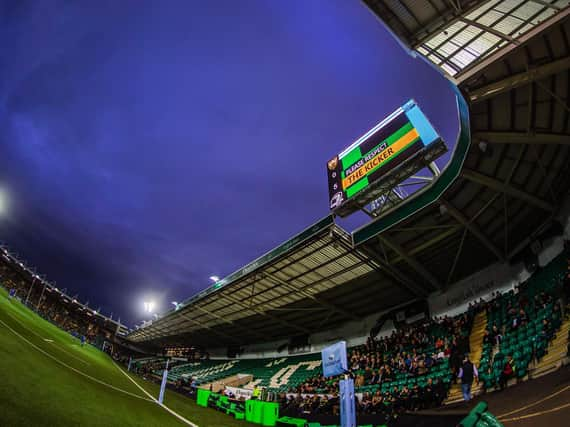Saints bid to follow in Sunderland's footsteps by starring in behind-the-scenes documentary


The fly-on-the-wall series will lift the lid on life at Franklin's Gardens.
Sports marketing giant CSM Sport & Entertainment has been engaged to find broadcasting and production partners for the project.
Advertisement
Hide AdAdvertisement
Hide AdIt would be rugby’s equivalent to the Netflix series Sunderland ’Til I Die.
There is a connection between Northampton and Sunderland as Saints commercial director Tony Davison was previously the managing director at the Black Cats.
Davison featured in the second series of Sunderland 'Til I Die and he says the financial demands placed on Saints by the recent Covid-19 pandemic have prompted the club to look for extra revenue streams, one of which is the documentary.
“There is a far greater risk of doing nothing in this situation,” Davison told The Times.
Advertisement
Hide AdAdvertisement
Hide Ad“If we decide to do what everyone is doing then we are tied to traditional models and we have no way of getting an advantage or new income streams.
“We are dead keen as a club to find someone to show this for us and hopefully it is a new way of bringing in a bit of money and doing something different.
“There is something about sport that does stir people to get on board. Rugby struggles to appeal to a new demographic and to get the young people involved.
"If this ended up on Amazon or Netflix you could get a whole new generation of fans as well as a whole new spread of fans (around the world).
Advertisement
Hide AdAdvertisement
Hide Ad“It could be that we become the club team of choice for a whole new generation and that opens up commercial opportunities.”
The documentary process is expected to start before the end of the year, with director of rugby Chris Boyd on board with it all.
Boyd was head coach at the Hurricanes when a film crew documented their pre-season campaign in 2016.
“The producer was very rugby savvy; he knew and respected boundaries, so the boys loved him,” Boyd said.
Advertisement
Hide AdAdvertisement
Hide AdAs for Davison, who joined Saints four months ago, his previous documentary experience wasn't an entirely comfortable one as Sunderland struggled badly.
Sunderland 'Til I Die featured relegation from the Championship and a failure to secure promotion from League One as the former Premier League club's below-par performances continued.
“I watched the Sunderland series through my fingers but you have to trust in the documentary makers,” Davison said.
“If you try and restrict access then the output isn’t very interesting.
Advertisement
Hide AdAdvertisement
Hide Ad"If it was up to me I probably would (have the players wearing microphones). You have to be open to the film-makers. They will ask for everything.
“We know we have an interesting story to tell. We are in the middle of an interesting period of rugby’s evolution, coming off the back of Covid-19 and what that means to an elite sports club — and a club which can’t just get the owners to write a cheque that will make all the bad stuff go away.
“We need to scrap for every penny but at the same time we are in the entertainment business so we need to give something to the town.
"All these different juxtapositions coming into one could make for a really fascinating insight.
Advertisement
Hide AdAdvertisement
Hide Ad“Everyone has got a part to play. If we can get that across it will be a successful documentary."
Davison had some difficult issues to contend with during the filming of Sunderland ’Til I Die.
He was forced to have redundancy discussions, but the documentary did not feature those in the end.
And he was also forced to face the cameras after defeat to Charlton Athletic in a play-off final at Wembley.
Advertisement
Hide AdAdvertisement
Hide Ad“That was the toughest time,” Davison said. “I had to drive into work the day after the final, when we had lost with the last kick of the game.
"There were cameras in the car and they ask you how you feel — and you don’t really want to have that conversation.
“But my job is to try and deliver the right commercial upside to help put a successful team on the pitch. A documentary would help us do that.
“It does have to be worthwhile (financially) because we do know there is a risk and there could be potential downsides, so you need to balance all things — but nothing ventured nothing gained."